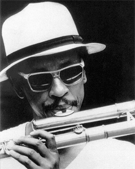Henry Threadgill
 In an era when imitation is rampant and originality rare, Henry Threadgill thrives by making music that sounds like nothing else.
In an era when imitation is rampant and originality rare, Henry Threadgill thrives by making music that sounds like nothing else. With one eye focused on the past and present, the other on the future, this maverick saxophonist, composer and bandleader defies categorization. Equal parts jazz and contemporary classical, cutting-edge and traditional, bluesy grit and urbane sophistication, his work combines foreign and familiar styles in daring new ways that invite audiences to share in his quest for aural adventure.
"The only way to make a discovery is to go to the limit of what you know," Threadgill said.
"Then you have to go over that line, to what you don`t know," he continued, speaking from his New York home. "As long as you work within the confines of what you know, you won`t get anything new."
Threadgill`s restless nature and unflagging creative drive have been constants in his music for more than 25 years.
During that time he has led such genre-leaping ensembles as Make A Move, The Society Situation Dance Band, Air, New Air (in which the singer Cassandra Wilson first garnered attention in the mid-`80s) and Very Very Circus (which included two tubas, two electric guitars, French horn, drums and Threadgill on saxes and flutes). His latest group, Zuit, features cello, tuba, acoustic guitar, drums and the oud, a lutelike Middle Eastern instrument.
But no matter how large or small his bands, or what styles he mixes and matches, his music is instantly recognizable - and almost always unclassifiable.
"What I`m interested in," said the 56-year-old musician, "is expression. High expression."
MARIACHI TO FOUR TOPS
Born and raised in Chicago, Threadgill was originally a boogie-woogie pianist. He switched to sax while in high school, then added flute and clarinet to his instrumental repertoire.
A marching-band veteran who performed in civic parades as a teen, he also worked in groups playing styles as varied as polka, blues and mariachi. He earned his soul-music stripes backing the Four Tops and the Dells, did a stint in a circus band and, while studying at Chicago`s American Conservatory of Music, became a protege of pioneering pianist/composer Muhal Richard Abrams.
Threadgill`s college classmates included such future progressive-jazz stars as drummer Jack DeJohnette and fellow saxophonists Anthony Braxton and Joseph Jarman. Even more so than his illustrious colleagues, he transcended his many influences, as his impressive series of recordings over the past quarter-century attest.
"My parents were very supportive, and there was a lot of music around me," Threadgill said, recalling his formative years. "And there was no such thing as: `You can`t do that.`"
Bold and provocative, his multifarious compositions employ unique instrumental combinations and voicings that highlight his mastery of space, tonal colors and what he calls his "satellite system of music." He combines elements of country, blues, gospel and more, mixing them with influences that range from envelope-pushing composers like Varese, Hindemith and Poulenc to Duke Ellington and such avant-jazz icons as Cecil Taylor and Ornette Coleman.
The result is an enticing confluence of idioms and cultures, from near (urban and rural America, the Caribbean) and far (Europe, South America and India, where Threadgill has spent an increasing amount of time in recent years).
"The language I use expands, always, because everything is constantly building and growing," he said. "We live in an expanding universe."
QUALITY, RISK-TAKING
By placing an equal emphasis on quality and risk-taking, Threadgill has created an enduring body of work. And he has refused to compromise his creative vision, whether recording for major labels or small, independent companies.
"People like Einstein, Beethoven and Charlie Parker had their own rules and aesthetics, which had nothing to do with media hype or ratings systems. We`ve been confused by these things," he lamented.
"When a new movie comes out, the first thing you hear is how much it cost (to make) and, then, how much it`s making, as if numbers determine who or what is great. It`s the same with albums. All of this is a diet for mediocrity. No one remembers last year`s `Star Wars` movie, but we all remember `The Maltese Falcon.` Why? Because it was great. Is that too much to ask for?"
Threadgill has two new albums due out in the fall, each with a different band. These will be his first releases since 1996`s superb "Where`s Your Cup?"
The gap in between means that many of his compositions from the past five years will fall by the wayside, heard only by those fortunate listeners at his concerts.
"After so much time passes, I don`t want to go back," Threadgill said. "And I can`t go back, because there was an evolution in what I was doing. I have to keep going forward. I follow my intuition, and I have an innate feeling that there`s gold in them thar hills!"
(c) Copley News Service
advertisement

Author: George Varga
Archives
The Verve Pipe
Judy Collins
Jewel
Ben E. King
NSYNC
311
Nickel Creek
Brian Wilson
Spinal Tap
Mark Knopfler
SR-71
Stevie Nicks
Iggy Pop
Joe Jackson
Nelly Furtado
More Articles







